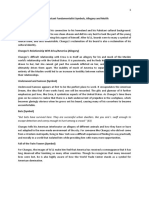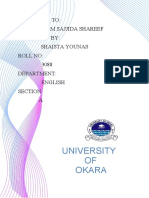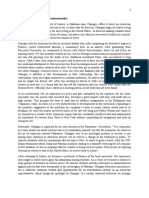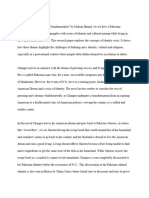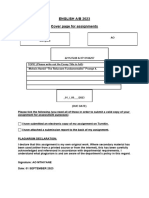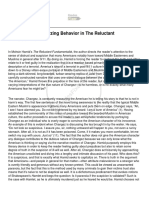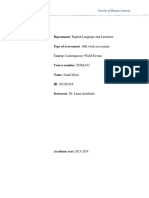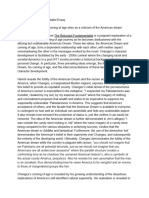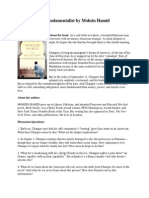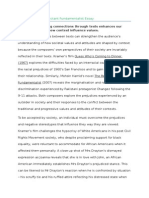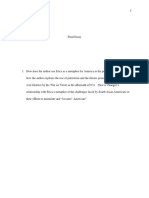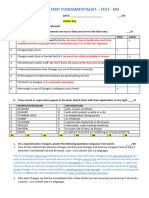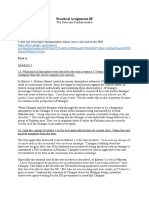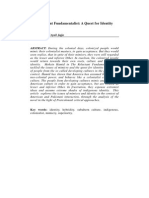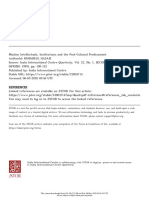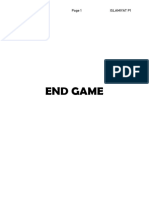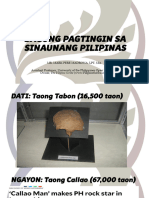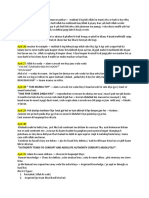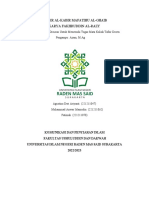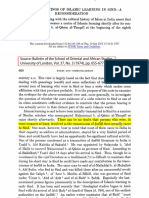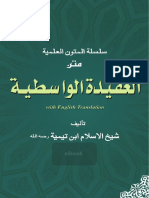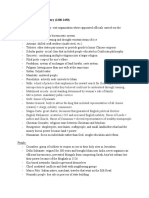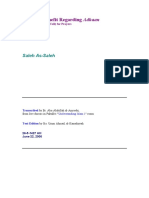A Review of The Reluctant Fundamentalist, by Mohsin Hamid
Hamish Hamilton, 2007, 209 pp.
The Reluctant Fundamentalist , the second novel by the Pakistani born, recently naturalized
British writer Mohsin Hamid, is more than it appears to be. Which is, a terse, clever, minimalist
thriller relating a chance meeting between an unnamed American and a US educated Pakistani
in a downtown Lahore street café, sometime after the US-led invasion of Afghanistan. It is also
a prolonged exercise in ambiguity, the account of a culture clash in which two worlds observe
each other at close quarters, attracting, repelling, and ultimately failing to understand.
This judgement seems to have been endorsed by the University of St Andrews in Scotland,
which took the unprecedented step of gifting the novel to all incoming undergraduates in
2009, and making it compulsory reading. Behind the initiative is the belief that it can
‘stimulate the kind of debate on which universities thrive’.
The Reluctant Fundamentalist opens with an offer. Excuse me, sir, but may I be of assistance?
The narrator, Changez has buttonholed a fellow diner (whom he has singled out as an
American), sitting on a seat with his back to the wall. The American, who has no name, and
never speaks, becomes the recipient of a monologue which lasts the length of the book. It
takes us through Changez’s life story, from his days at Princeton as a top-performing overseas
student to his disillusioned, post 9/11 return to Pakistan. The narrative is interspersed at
regular intervals – marked by chapter breaks – by brief returns to the here and now, as night
falls in Old Anarkli and the silent American begins to shift uncomfortably in his seat, an
increasingly reluctant dining companion - ‘I see, sir, that there continues to be something
about our waiter that puts you ill at ease.’
Changez tells the story of how he embraced the American dream. After Princeton he walks into
a high paid job as a financial analyst for a New York company, Underwood Samson, whose
business is to put a price on other businesses which come onto the market. Within months, he
has made it to the top. At the same time, he begins a love relationship with Erika, a Princeton
graduate like himself, who comes from a patrician New York family. It is a troubled, slow-
moving, unconvincing affair; Erika cannot allow herself to forget her former, and only lover,
Chris; Changez is watching himself becoming an upwardly mobile New Yorker as he carves out
a place for himself in the hearts and minds of Erika and her appreciative parents.
Psychologically, the relationship is less than convincing, as chronic nostalgia for Chris turns
into a pathological condition, and Erika ends up being committed to an institution and
ultimately disappearing from Changez’s life. But a clue to what Hamid is trying to do lies in the
names. For Erica, read Am Erica, while at least one reviewer has seen Chris as representing
the first white American, Christopher Columbus.
Things go sour with 9/11. Changez’s initial reaction, watching events on television in a Manila
hotel room, is to smile: ‘I turned on the television and saw what at first I took to be a film. But
as I continued to watch, I realized that it was not fiction but news. I stared as one – and then
the other – of the twin towers of New York’s World Trade Center collapsed. And then I smiled.
Yes, despicable as it may sound, my initial reaction was to be remarkable pleased (…) But at
that moment, my thoughts were not with the victims of the attack (…) – no, I was caught up
with the symbolism of it all, the fact that someone had so visibly brought America to her
knees.’
Back in the US Changez begins to feel the backlash. It begins at immigration, on the return
from Manila, when he is separated from the rest of the team. ‘What is the purpose of your trip
�to the United States’ the official asks. ‘I live here’ is the reply. ‘That is not what I asked you’ is
the glib retort. In the company car park a stranger refers to him as a fucking Arab. Changez
finds himself taking sides. When he sees the ‘ghostly night-vision images’ of American troops
he finds his own reaction catches him by surprise: ‘Afghanistan was Pakistan’s neighbor, our
friend, and a fellow Muslim nation besides, and the sight of what I took to be the beginning of
its invasion by your countrymen caused me to tremble with fury.’
For Changez, the American Dream, has darkened, and he begins now to contemplate returning
to Pakistan; while in the parallel framing narrative, the here and now of Lahore, night is falling
fast , and the sense of ambiguous tension increases. The silent American is getting nervous. A
bulge in a pocket ‘parallel to the sternum’ as he shifts uneasily in his chair, suggests he is
armed. And he is angry, too, at the way the story is unfolding, at least if we are to believe
Changez’s commentary on his reactions. In the final chapter Changez accompanies him to his
hotel, followed, or shadowed, by the waiter from the café:
‘Yes, he is waving at me to detain you. I know you have found some of my views offensive; I
hope you will not resist my attempt to shake you by the hand. But why are you reaching into
your jacket, sir? I detect a glint of metal. Given that you and I are now bound by a certain
shared intimacy, I trust it is from the holder of your business cards.’
And that is it, with the intentions of the waiter, the identity of the American, and the role of
Changez, all left to the reader.
But, we said, The Reluctant Fundamentalist is more than a well-timed thriller. Ambiguity is not
just a means for creating, and keeping, tension; it is the underlying message of this book. In a
globally inter-dependent, post 9/11, world nothing is clear cut or permanent, allegiances are
strategic and can change from one moment to the next, and identities – including one’s own -
need constant monitoring. Changez’s introspections progress from a sense of superiority - as
privileged outsider and top Princeton performer - to uncertainty and even self deprecation. He
begins to see himself a mercenary in the pay of a foreign power:
‘I was a modern day janissary, a servant of the American empire at a time when it was
invading a country with a kinship to mine and was perhaps even colluding to ensure that my
own country faced the threat of war.’
Changez sounds like a good name for a turncoat, to Western ears at least. But, Mohsin
explains, it is the Urdu version of Genghis, implicitly suggesting that Changez is not to be seen
as an avenging muslim fundamentalist (Genghis Khan). The fundamentalism is elsewhere, in
the ruthless pursuit of gain which is the underlying philosophy of the company Changez works
for (and in the name, Underwood Samson, it is easy to see a mixture of subterfuge and brute
strength):
‘Focus on the fundamentals’ This was Underwood Samson’s guiding principle, drilled into us
since our first day at work. (..) And that was precisely what I continued to do, more often than
not with both skill and enthusiasm.’
As the best of 6 trainees in his cohort, he is able to put aside any feeling of human sympathy
for the workers he comes into contact with, and who are going to lose their jobs as a result of
the downsizing operation he is planning for the company:
‘to be perfectly honest, sir, the compassionate pangs I felt for soon-to-be-redundant workers
were not overwhelming in their frequency; our job required a degree of commitment that left
one with rather limited time for such distractions.’
�Until 9/11, that is, and the disillusionment with the American brand of fundamentalism which
has become his life. Stylistically, the narrative captures this disillusionment well, through a
vein of mock formality which transmits sarcasm as well as adding to the ever present sense of
menace. It is present in the subservient way in which he addresses the American (‘Excuse me,
sir, but may I may of assistance?’), and in the coaxing and cajoling (‘Come, tell me, what were
you looking for?’ ‘I hope your disgust has not banished your appetite’). The choice of a
ritualistic present simple (‘Why do you recoil?’ ‘You hesitate, sir’), instead of a more informal
present progressive (‘Why are you hesitating?’) also seems appropriate against the unfolding
ritual of the meal in the street café.
One of the most immediately visible features of this style is the frequent italicizing of words for
emphasis; Changez weighs his words carefully, especially when they are sentence-final:
‘I noticed that you were looking for something; more than looking, in fact you seemed to be on
a mission.’
‘I was telling you about my interview with Underwood Samson, and how Jim had found me to
be, as he put it, hungry.’
‘On that day, I did not think of myself as a Pakistani, but as an Underwood Samson trainee,
and my firm’s impressive offices made me proud.’
‘But tonight, as I think we both understand, is a night of some importance.’
All these formal features make for a polished, rational text, giving the reader, and the listener,
the sense that Changez is in control. They also, perhaps, help create a sense of linguistic
neutrality, of a mid-atlantic or rather global English which is neither American, nor British, nor
South Asian, but with elements of each (such as American spellings, Britishisms such as chap,
and, in its general preference for a more formal register, perhaps South Asian). Changez’s own
reflection on his elegant idiolect is worth quoting at length:
‘I have subsequently wondered why my mannerism so appealed to my senior colleagues.
Perhaps it was my speech: like Pakistan, America is, after all, a former English colony, and it
stands to reason, therefore, that an Anglicised accent may in your country continue to be
associated with wealth and power, just as it is in mine. Or perhaps it was my ability to function
both respectfully and with self-respect in a hierarchical environment, something American
youngsters – unlike their Pakistani counterparts – rarely seem trained to do. Whatever the
reason, I was aware of an advantage conferred upon me by my foreignness, and I tried to
utilize it as much as I could.’
It is insights such as these which may have prompted St Andrew’s University to set the text as
prescribed reading for incoming students about to enter their own different kind of hierarchical
environment. They also, probably, tell us a lot about Hamid’s own bicultural experience and
‘ablity to function’ in very different environments, parallel but not identical to Changez. After
9/11 Hamid returned to the UK (calling himself a Bush era exile’), and became a British citizen
in 2006 but in 2009, (rather later than Changez), decided to return to Pakistan, back to his
home town of Lahore, as the most appropriate place to bring up his newly born daughter;
whereas Changez, biding time in the Lahore twighlight, waiting for the next event in the great
game, confesses to feeling ‘rather like a Kurtz waiting for his Marlow.’
This is a reminder that the Reluctant Fundamentalist is also a novel about changing places,
(while incidentally, staking a claim for itself within a grand postcolonial current). What you see,
how you interpret the final gesture, depends on who you are, and where you are. Hamid
�recounts that his American friends assume that the American is about to be physically
eliminated by the waiter, in cahoots with Changez: whereas seen from Pakistan, the glint of
metal in the American's pocket spells the end for the over-effusive narrator. It is this open
ending, which is at the same time an elegant solution to the thriller, and the statement of the
problem of point of view, which makes it more than a well constructed, but lightweight
novella: The Reluctant Fundamentalist is a book which needs to be read in different places,
and which grows heavier in the re-reading.

